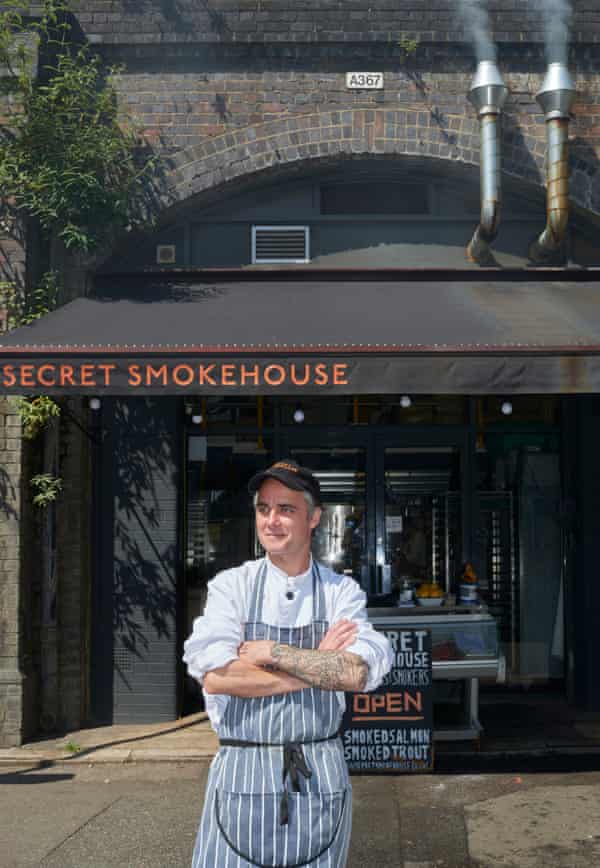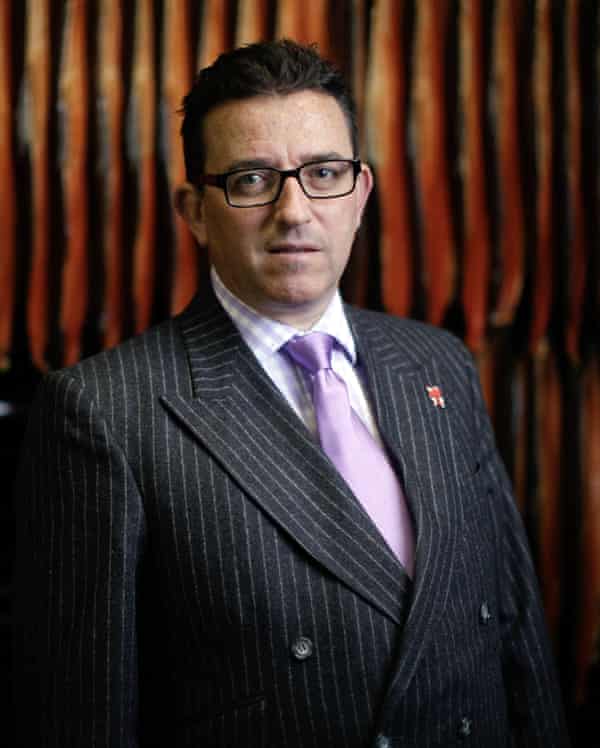Surf and turf: the Brexit MEP and his smoked salmon war | Food
There are only two smokehouses with the right to sell London Cure smoked salmon and they are less than two miles away from each other.
In one corner of east London, tucked in an archway just off London Fields, is the relative newcomer Secret Smokehouse, which was originally started in founder Max Bergius’s shed. And in another, next to the Olympic Park in Fish Island, is the established titan, H Forman & Son, run by former Brexit party MEP Lance Forman. His family business has been producing smoked salmon in the East End for 116 years and claims to be the last of the original smokehouses.
They are both famed for the quality of their salmon and they both have premium clientele. Secret Smokehouse lists the multi-Michelin-starred chefs Claude Bosi, Heston Blumenthal and Clare Smyth as clients, while Forman’s includes the Connaught hotel in Mayfair and the Royal Opera House. It also claims to have supplied Buckingham Palace.
But behind the scenes there appears to be an increasingly bitter rivalry brewing, punctuated with accusations of bullying, imitation and a very heated debate about the salmon’s pellicle (the part of the fish that’s most exposed while curing).

The origins of the apparent discord appear to date back to 2017, after both smokehouses were awarded Protected Geographical Indication (PGI) status – joining the ranks of the Cornish pasty, Gouda cheese and Thüringer Rostbratwurst, a German sausage.
Forman applied for the prestigious status for London Cure, which is defined as “salmon cured and smoked using only a combination of rock salt and oak smoke”, and in 2017 was granted it. The celebration ceremony was attended by Michael Gove, then the newly appointed environment secretary. But unknown to Forman, or so he claims, Bergius, whose business in five short years has soared from obscurity to the culinary A-list, was also awarded the status.
In a Twitter spat that year, which Forman claims was started by Bergius, the former accused him of imitating his company and not meeting the requirements, and branded him a “fake”. “It’s because your product is not produced to PGI standards despite posting PGI recognition on your website and attempting to copy what we do,” tweeted Forman. Bergius retorted by accusing him of “misleading the consumer”.
Four years on, the smokers have yet to meet but the accusations have ratcheted up a few notches. In a recent Daily Mail article, Forman accused Bergius’s business of “potentially acting illegally”. He claimed that to classify as London Cure, the smoky crust of the salmon – the pellicle – has to be sliced off, which he claimed Secret Smokehouse does not do. In response, Bergius says he has undergone the necessary audit and been approved by the Department for Environment Food and Rural Affairs (Defra).
But this has not been enough to dampen the sizzling tension. Forman continues to dispute Bergius’s processes, while Bergius accuses Forman of repeatedly calling Defra on him – which Forman confirms – leading to inspections at Secret Smokehouse.
Bergius goes further – accusing Forman of being a “greedy aggressive angry man” who it appears “hates everybody else” unless they do what he says.

“We’ve just been through a pandemic,” says Bergius in his archway, where trays of salmon cure on salt in the kitchen as trains rattle overhead. “The last thing you should be surely doing is trying to take a fellow smoker down.” London and the UK, he says, are “big enough, for not only us but a whole array of brilliant smokehouses to be smoking and supplying lots of people. But this particular chap just goes around town bullying everybody, slagging everybody off, whether it be us, whether it be other smokehouses.”
He also accuses Forman of badmouthing companies, including Secret Smokehouse, to restaurants, alleging the former MEP puts pressure on them to use his salmon rather than that of competitors.
A former buyer for high-end stores suggests that perhaps Forman is envious of Bergius’s success? “Envy’s really not my thing at all,” says Forman. He strongly denies all Bergius’s claims of bullying, aggression, intimidation and pressure tactics.
While there is a small but healthy fish smoking scene in and around the capital, only two places have PGI status. This, industry figures say, is largely because the specification is so tailored to Forman’s specific process. It also requires businesses to be based in a small area of London – either Tower Hamlets, Hackney or Newham.
Bergius, who says he is working with Defra on an amendment to the specification, wants to make the status more inclusive so that more businesses can apply. Forman, Bergius claims, is unhappy with this and wants to “picket fence” London Cure.
“I want to be philanthropic about it. You can’t be the only coffee shop in London, you can’t be the only bakery in London. Come on. Let such a lovely old East End tradition thrive and flourish,” says Bergius.
Forman says Bergius could easily meet the specification, but that, if he wants to do things differently, he could call his product “Hackney cure smoked salmon”.
“We welcome other businesses who wish to produce London Cure smoked salmon so that more of this amazing product can be enjoyed by food lovers,” Forman says. “What we don’t appreciate is firms claiming that their product has PGI status while fundamentally changing the methods of production. This gives diners a false impression of how London Cure smoked salmon is meant to taste.”
Defra said it could not comment on individual cases.
A history of smoking
The rich history of salmon smoking started in the late 1800s when immigrants from eastern Europe settled in the East End and used the method to preserve fish before the invention of refrigerators. Several smokehouses remained until the 1970s but the majority went after the rise of automation in subsequent years.
According to the EU specification, the London Cure, which applies to both farmed and wild salmon, should have a “mild and delicate” flavour and aim to “subtly enhance the flavour … ensuring that the predominant taste is of salmon”.
The Department for Environment, Food and Rural Affairs works with the body that verifies London Cure to make sure all producers are compliant with the rules of the UK Geographical Indications scheme.
Source: theguardian.com

